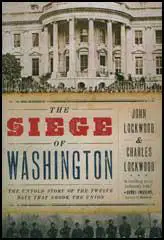Spartacus Review
Volume 54: 27th August, 2011
American Civil War

Title: The Dogs of War : 1861
Author: Emory M. Thomas
Editor:
Publisher: Oxford University Press
Price: £9.99
Bookshop: Amazon
Spartacus Website: American Civil War
Category:
In 1861, Americans thought that the war looming on their horizon would be brief. None foresaw that they were embarking on our nation's worst calamity, a four-year bloodbath that cost the lives of more than half a million people. But as eminent Civil War historian Emory Thomas points out in this stimulating and provocative book, once the dogs of war are unleashed, it is almost impossible to rein them in. In The Dogs of War, Thomas highlights the delusions that dominated each side's thinking. Lincoln believed that most Southerners loved the Union, and would be dragged unwillingly into secession by the planter class. Jefferson Davis could not quite believe that Northern resolve would survive the first battle. Once the Yankees witnessed Southern determination, he hoped, they would acknowledge Confederate independence. These two leaders, in turn, reflected widely held myths. Thomas weaves his exploration of these misconceptions into a tense narrative of the months leading up to the war, from the "Great Secession Winter" to a fast-paced account of the Fort Sumter crisis in 1861. Emory M. Thomas's books demonstrate a breathtaking range of major Civil War scholarship, from The Confederacy as a Revolutionary Experience and the landmark The Confederate Nation, to definitive biographies of Robert E. Lee and J.E.B. Stuart. In The Dogs of War, he draws upon his lifetime of study to offer a new perspective on the outbreak of our national Iliad.

Title: The Siege of Washington
Author: John and Charles Lockwood
Editor:
Publisher: Oxford University Press
Price: £17.99
Bookshop: Amazon
Spartacus Website: Civil War: 1861-1865
Category:
On April 14, 1861, following the surrender of Fort Sumter, Washington was "put into the condition of a siege," declared Abraham Lincoln. Located sixty miles south of the Mason-Dixon Line, the nation's capital was surrounded by the slave states of Maryland and Virginia. With no fortifications and only a handful of trained soldiers, Washington was an ideal target for the Confederacy. The South echoed with cries of "On to Washington!" and Jefferson Davis's wife sent out cards inviting her friends to a reception at the White House on May 1. Lincoln issued an emergency proclamation on April 15, calling for 75,000 troops to suppress the rebellion and protect the capital. One question now transfixed the nation: whose forces would reach Washington first-Northern defenders or Southern attackers? For 12 days, the city's fate hung in the balance. Washington was entirely isolated from the North-without trains, telegraph, or mail. Sandbags were stacked around major landmarks, and the unfinished Capitol was transformed into a barracks, with volunteer troops camping out in the House and Senate chambers. Meanwhile, Maryland secessionists blocked the passage of Union reinforcements trying to reach Washington, and a rumored force of 20,000 Confederate soldiers lay in wait just across the Potomac River. Drawing on firsthand accounts, The Siege of Washington tells this story from the perspective of leading officials, residents trapped inside the city, Confederates plotting to seize it, and Union troops racing to save it, capturing with brilliance and immediacy the precarious first days of the Civil War.
